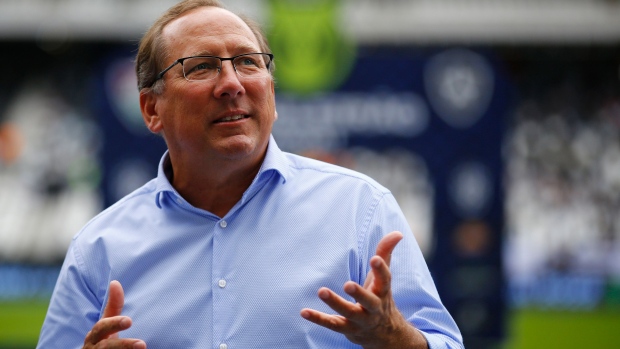Aug 11, 2022
Football Fanatic Builds $1 Billion Bet Against Game’s Mega Rich
, Bloomberg News

(Bloomberg) -- John Textor has taken just 12 months to go from fanatical football fan, watching hundreds of games a year, to one of the sport’s biggest investors.
He’s acquired stakes in teams from London to Rio de Janeiro, building a football empire like a business to cast himself against the game’s mega rich elite. It’s a second act for Textor, who forged his reputation and wealth over decades as an investor in disruptive digital technologies.
The switch to football has been rapid even by the current standard of Americans piling into the sport. And he isn’t done yet, having recently entered talks to buy French Ligue 1 team Olympique Lyonnais in what will be his biggest bet on the game to date. If it completes, Textor’s football stable will have a value of about $1 billion including debt.
“My football plan is to create an ecosystem of cooperative top-tier clubs that will benefit from the sharing of a global footprint of talent identification,” Florida-based Textor said in an interview.
Read more: The Florida Financiers Buying Up Europe’s Soccer Teams
The 56-year-old’s journey as a football owner began a year ago this week, when he bought into English Premier League team Crystal Palace FC. Investments in Brazilian club Botafogo and Belgium’s RWD Molenbeek quickly followed via his Eagle Football Holdings LLC vehicle.
This multiclub model is favored by other US-based investors looking to bring down the costs of football ownership. They believe that by sharing players across teams, the need for spending millions of dollars on pricey transfers, wages and agents’ fees is largely eradicated.
Textor sees the approach as an antidote to clubs like Paris Saint-Germain FC, Manchester City FC and Chelsea FC, whose recent successes have been bankrolled by energy-rich states and billionaires.
“Ted Lasso could win with Manchester City’s roster,” Textor said, referring to the fictional coach played by Jason Sudeikis in the popular Apple TV+ show. “I am merely hoping to demonstrate that alternative approaches to competitiveness must be explored and encouraged.”
Big Clubs
Critics of the multiclub model say it creates farm teams with the sole purpose of serving a trophy asset within a group. But Textor has been bold with his choice of clubs and it’s unlikely supporters of Crystal Palace and Lyon, in particular, will want to play second fiddle to each other.
Quite the opposite: the fanbases will likely demand investment in squads and infrastructure to help win trophies and qualify for more prestigious and lucrative competitions.
Crystal Palace finished last season 45 points behind Champions Manchester City. The team, which hasn’t won a major trophy, began its current EPL campaign last week with a 0-2 defeat to Arsenal FC. Lyon, more accustomed to success in its domestic league, has been outmuscled in recent years by Qatar-backed PSG, while Botafogo is seeking a return to glory after a period of financial turmoil.
“If we build controlled, integrated pathways between countries and clubs, we can be recognized by aspiring players in our markets as a great place to develop, allowing us to sign players before the major clubs can buy them,” Textor said. “Developing players is better than trading players, for competitive success and for our business.”
Passion, Profit
A former competitive skateboarder, Textor’s passion for sports is easy to see, especially on social media. The frequent Twitter user has already called for a Brazilian referee to resign after he awarded a penalty against Botafogo -- an unusual move for a club owner -- and poked fun at Lyon’s Ligue 1 rivals Olympique de Marseille, joking that the nine-time champions are a “small club.”
While his early football bets were funded primarily with his and his wife’s money, Textor now has other investors to keep happy. The Lyon deal has the backing of Cannae Holdings Inc., an investment vehicle controlled by Bill Foley, owner of the Vegas Golden Knights NHL team. Jamie Salter, the head of Reebok owner Authentic Brands Group LLC, has backed Eagle Football, Textor said.
Unlike traditional European football owners, US investors have shown themselves to be more focused on generating a return on capital in the sport and Textor is looking to leverage his experience in digital tech to find new ways of generating revenue from fans of his clubs.
“Football is in the dark ages when it comes to fan engagement,” he said. “The audience is more valuable than the team.”
Face Time
One of Textor’s most high-profile deals was the 2020 merger of streaming platform fuboTV Inc., where he was once executive chairman, with Facebank Group, a company he founded. Facebank specializes in facial recognition technology, which Textor said can be used to bring fans closer to the clubs they support and, crucially, make it easier for them to spend on merchandise.
He’s rolling out a face recognition system at Botafogo that supporters can use for ticketing, stadium entry and matchday purchases. The plan is to offer the same at Crystal Palace, where Facebank already has a sponsorship deal, and Lyon in the future.
“With the Facebank fan engagement system you can join with your face, pay for your hot dog with your face,” Textor said.
To be sure, Textor’s business record is not without its blemishes. Ten years ago, Digital Domain Media Group Inc., a visual effects group he led that created graphics for movies including “Titanic,” filed for bankruptcy. “I didn’t lose money on that deal,” he said. “But I lost everything else that mattered to me at that time.”
Looking further ahead, Textor hasn’t ruled out investing in more football clubs or eventually pursuing an initial public offering of his investment vehicle.
“As a next step, large sources of equity will be introduced into Eagle Football,” he said. “I’ll take partners with a common vision.”
©2022 Bloomberg L.P.





